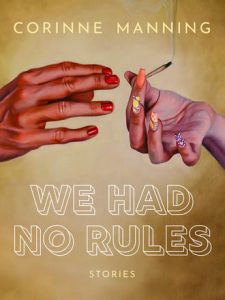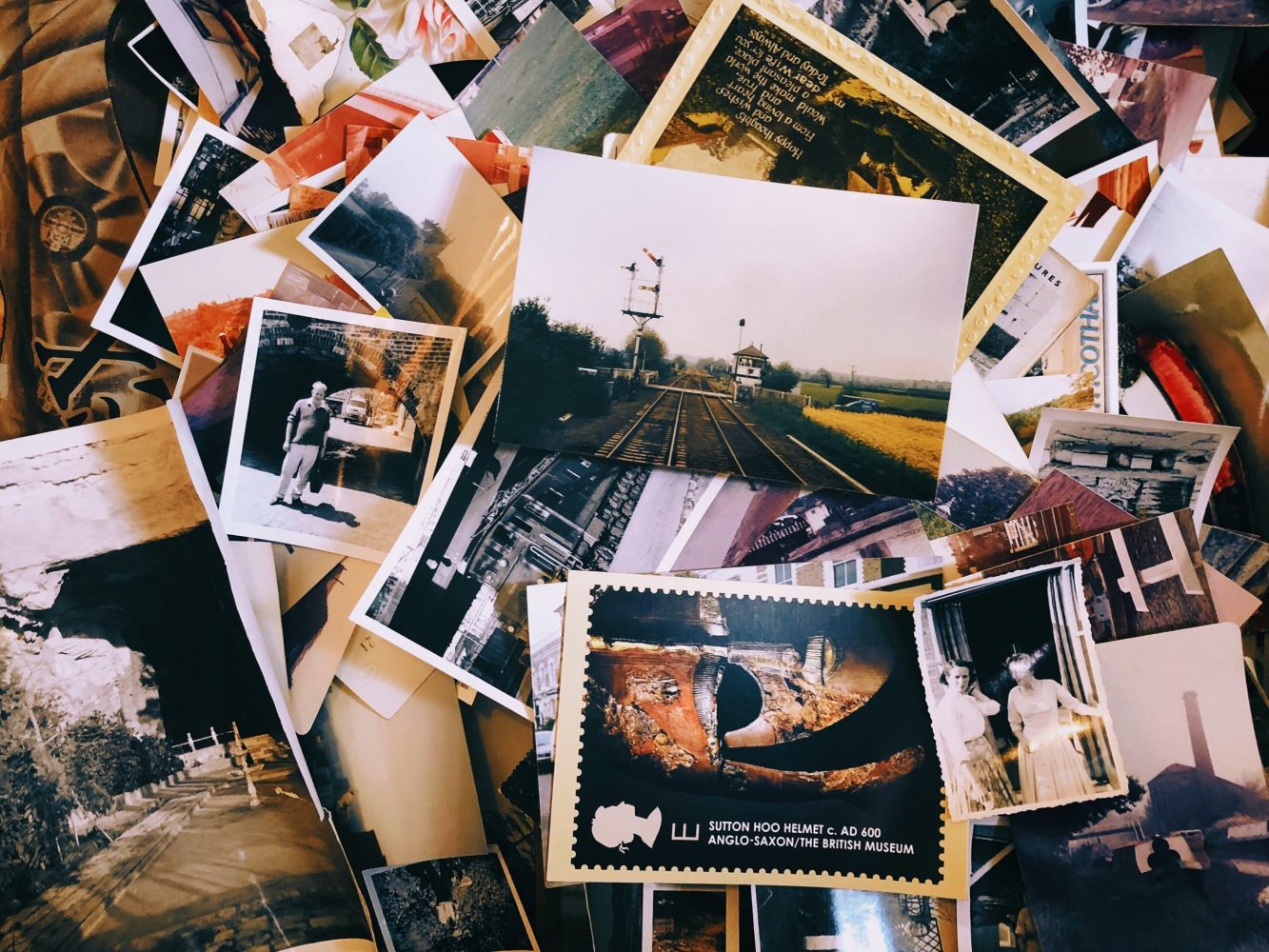Recommended Reading
Wearing Rainbow at a Funeral
"The Appropriate Weight" by Corinne Manning, recommended by Arsenal Pulp Press

INTRODUCTION BY BRIAN LAM
Mattilda Bernstein Sycamore, the Lambda Literary Award-winning author and editor, was the one who first alerted me to the work of Corinne Manning. We had just published Mattilda’s novel Sketchtasy in the fall of 2018, and Corinne had written a beautiful and very personal review of it for Bomb magazine. I agreed to read Corinne’s manuscript based on Mattilda’s recommendation, and I was immediately taken in by the world she conjures up in these stories, as well as its beguiling  inhabitants: damaged castaways and lovelorn cynics, all of them unabashedly queer. It was the foundational queerness of the characters in We Had No Rules that got to me—they are rule breakers, as suggested by the title; they abide by their own codes of conduct, especially in a world divided by the haves and have-nots. They are emotional outlaws in the best sense of the word; as Tom Robbins said, “the first step toward becoming an outlaw is the refusal to be victimized.” And the characters in these stories are certainly not victims. But in refusing victimhood, they also acknowledge their own messy complications—they undergo personal reckonings while they process the cost of truly having no rules.
inhabitants: damaged castaways and lovelorn cynics, all of them unabashedly queer. It was the foundational queerness of the characters in We Had No Rules that got to me—they are rule breakers, as suggested by the title; they abide by their own codes of conduct, especially in a world divided by the haves and have-nots. They are emotional outlaws in the best sense of the word; as Tom Robbins said, “the first step toward becoming an outlaw is the refusal to be victimized.” And the characters in these stories are certainly not victims. But in refusing victimhood, they also acknowledge their own messy complications—they undergo personal reckonings while they process the cost of truly having no rules.
In the story “The Appropriate Weight,” excerpted here, a queer man reflects back on a life filled with both regret and transformation as he attends the funeral of his ex-wife; here, the intangible sensations of grief and loss intersect with what it means to desire, to be understood, and, in the end, to be human.
After we signed Corinne’s book, I was astonished to learn that We Had No Rules had been rejected by many publishers over the course of several years. They were told by editors that the story collection wasn’t “mainstream enough,” and that a book filled with primarily lesbian protagonists wasn’t “on trend.” But what those publishers missed is the collection’s central tenet, and in this divided world, its beating political heart: that those on the outside looking in deserve to be heard, and read.
– Brian Lam
Publisher, Arsenal Pulp Press
Wearing Rainbow at a Funeral
Corinne Manning
Share article
“The Appropriate Weight”
by Corinne Manning
My daughter fell apart while reading a poem. I sat in the back of the church because I didn’t want anyone to see me walk in, but at the moment she began crying I felt the strangeness of it, that if she were a little girl, I would be running to her side and catching her as she left the altar. But there was no way I was going to run up the long aisle now, letting shame trail behind me (which I wore out of habit for those present). This was different from your kids growing up. There are things you lose the right to do when you are no longer the one married to the deceased.
My ex-wife Miriam’s current husband replaced my daughter at the pulpit. He was barrel-chested, wore a diamond ring on his pinky that caught the afternoon light and flashed at us like a satellite at night. He looked more con man than journalist. I didn’t know that was something my ex-wife would like: Neil Diamond tapes ringing through his Ford Taurus, gin and tonics and playing cards, and her legs straight up in the air as they fucked. That is one of the rights I’ve lost—thinking about my ex-wife in that way. We mostly had sex missionary, but then, we were so young. I hadn’t had sex with anyone before, and neither had Miriam. No one told us much about what to do, so it felt lucky that we were able to figure it out and have orgasms. She orgasmed throughout our marriage, which, if I could give a eulogy, I would say. But that wouldn’t be for her benefit; it would be for mine. When her friends and family see me, they think about a life of not being loved, a life without any passion. They imagine me lying on top of her, my muscles tensed, unable to stay hard. It was never like that, but I realized in a bar bathroom late one night, in the final months of our marriage, that there was an opportunity for a very different kind of passion.
Oh, you’re thinking, I get it now. Like her family members did. My inability to carve a turkey made sense to them, and my irritability with their boring stories, and my nice shoes, and her nice shoes, and our clean house, and our dachshund, Murray, who loved me best, and our one gay child, who I’m not certain thinks of me at all.
Miriam’s husband bowed his head, restrained a sob, and though I hoped to leave before he was done speaking, the church was so quiet that even the shifting of seats would be a disturbance. There was no movement, just the sniffs of those around us, which sounded eerily like shutter clicks. Imagine our grief as photo ops. For a brief period, that’s what it is, until a few weeks go by and we are still grieving, but there’s no place for it anymore. The sob escaped and Miriam was supposed to run up and hold him, but that wasn’t going to happen, which sent another sob through him. He stepped away from the podium, looking lost and small, like a child bobbing in the ocean. And though we were all grateful when a young man (maybe his brother or son) stepped forward and caught him in a hug, I knew that he was feeling only weight—too heavy because it wasn’t Miriam’s weight—and that this man who hugged him was lacking some dip that existed only on her lower back—not the masculine centre of the back—where he would prefer to put his hand. Thus, it was no comfort at all.
…a few weeks go by and we are still grieving, but there’s no place for it anymore.
I stayed for the recessional. I recognized Miriam’s brother as the head pallbearer and saw him look at me, then look away. A few friends acknowledged me grimly. Miriam’s husband didn’t see me, but my daughter did, and hers was the only face that looked grateful. She might not love me the way Murray does, but she loves me in some deep and tragic way, which doesn’t necessarily mean she wants to talk to me.
“Sal’s a cunt man, and he wants it all over him,” Miriam said to me on the phone soon after she started dating the journalist/ gangster, while we were finalizing some logistics around the divorce.
I imagined him slick like a seal, their bodies slipping off of each other—joyous in all their fluids—and the bed a mess. I, too, was learning that the best sex was not tidy: the shit and cum and odor were part of what felt so good—to be an animal, to be loved as an animal, to the full extent of your body, thus reaching your soul. The filth meant fucking on an energetic level. It’s because Miriam said things like “Sal is a cunt man” that her family thinks I was an icy ruiner. But she hadn’t awoken me either.
…the best sex was not tidy: the shit and cum and odor were part of what felt so good—to be an animal, to be loved as an animal, to the full extent of your body…
“I got a question for you, if I may,” she said.
I heard her take a long drag from her cigarette while I deliberated. Technically, we weren’t supposed to be talking to each other—our lawyers had suggested that all correspondence go through them—but we had been together for nearly thirty years and we couldn’t help it, like her fingers sliding to the pack for a cigarette before the current one was finished.
“Are you … I’m not sure of the term … Are you the man or the woman?”
I groaned, and she started to laugh.
“Don’t be so PC. Do you take it or do you give it?”
I hadn’t agreed to be asked the question yet, so I bought time by clearing my throat and taking a long drink of water.
“Don’t tell me you’re too shy to answer this.”
“Don’t tell me,” I said, “that a few fucks from a meathead made you a bigot.”
“Make me less of one,” she said. “C’mon, you know I mean well. I don’t know the terms.”
“The term’s ‘bottom,’” I said, “but it’s not always about penetration.”
I wanted to say more about what it meant to be opened like that, the vulnerability and the weight and the pain—at the beginning and sometimes still—and the sheer disbelief that I was a space for claiming and fitting. She would have understood, but I was never that blunt with her. It was always this way—her expressiveness with me, and my restraint. Why change it now?
I will recognize the sound of her inhale from a new cigarette when her spirit hovers over me on the day I die (unless the right of a final visitation has also been stripped from ex-husbands; I’m not certain of the rules).
She laughed and I heard the smoke hiss out of her lungs. “I know what you mean. It’s that way with us, too.”
I waited in my car in front of the restaurant where the backroom was reserved for the reception. It didn’t seem right that I should be the first one there, but neither did I want to enter a crowded room. I wanted to hug my daughter, shake hands with a few old friends, and then escape out the back, my mouth tasting of salami and olives. Boredom finally sent me out of my car and into the backroom, where the wait staff were just putting out the first finger foods. They are invisible in much the same way I was invisible in the church. It’s the term “wait staff” that does it, kind of like “ex” in my case. They bustled around and pretended not to see me. I hovered behind them and made myself a plate of provolone and salami and artichoke hearts. I placed my little plate on a table when a few people started to filter in, including two old friends, a couple we used to have over for dinner. The husband, who was the Latin teacher at the school where Miriam taught language arts, had aged in the ten years since I’d seen him. His fit body (yes, I noticed back then) had given way to something pouchy and loose. His wife kissed both my cheeks and the husband took both my hands in his.
I will recognize the sound of her inhale from a new cigarette when her spirit hovers over me on the day I die.
“We were hoping we’d see you today, but we weren’t sure.” The sound of his voice was like that inhale of Miriam’s cigarette. Standing with these two old friends in this new setting, with these new lives—I wasn’t sure what to say.
“Is your friend here?” the wife asked, and her husband gave her a look, which I didn’t know how to interpret: We don’t know whether they are still together or It’s not appropriate for him to bring him? I had thought the latter and told Dale it would be best if he stayed home.
“Dale stayed back in New Hope,” I said, feeling like the place where I lived was a cliché of rainbow flags and late-in-life come-outs and bi-curious teenagers—which it was.
His wife gave me a look of pity. “It would have been okay to bring him.”
“I didn’t think it would be appropriate. Besides, he had to work.” The former a truth, the latter a lie.
They nodded and the talk was forced for a time, until either the husband or I said something that made us all laugh and we were great friends, minus one, and in the wrong setting.
Others arrived, including my daughter, who approached the three of us immediately. She looked like her mother had at her father’s funeral—her hair thin and pulled back tight, her face pale without makeup. The girls she dated always looked just like her—femme but in a softball-tour-bus kind of way.
Once, while she was in college, not long after she came out, she called me and asked, in the blunt manner of her mother: “Do you identify more with being gay or queer?”
A younger boyfriend had explained his version of the difference to me, after I told him that my attraction had less to do with genitals and more to do with the way I was handled and what he called my expansive desire, and that I listened to Democracy Now. So I didn’t have to think about my answer to this question for very long.
“Queer,” I said.
She rolled her eyes, and I had to prompt her a few times before she’d say anything more.
“I shouldn’t get annoyed when you say it. Men can’t understand feminist liberation.”
I didn’t like that she called me a man, but I didn’t have the language then and don’t quite still.
“So you’re a—” and I waved my hand in the air a few times, waiting for the reveal.
“You can’t even say it,” she said, her voice trembling with hurt. “I’m a lesbian. You can’t even say it.”
I slipped my arm over her shoulders and she surprised me by wrapping her arms around my waist. I kissed her lesbian head, and my friends excused themselves to the buffet, plentiful now with baked ziti and meatballs.
“Where’s Dale?”
“Couldn’t make it,” I said.
I offered my plate to her, but she shook her head. So I took a bite of cheese and then offered the cheese to her and she took it. I took a bite of artichoke and then offered the artichoke to her and she took it. Certain rules, long established, stay the same. One or two of Miriam’s family members came over to say hello, but they didn’t ask about Dale. While I made small talk with them, I continued to feed my daughter until all that was left was an olive, which I popped in my mouth because she doesn’t like them.
When my daughter stepped away to speak with Sal’s daughter—“Closeted,” she whispered to me, “I know it”—I was alone in the middle of the room, but I felt like I could pass through the people around me, that I didn’t look small and swimmy, as Sal had near the altar. Sal wasn’t there yet. I tossed my plate away and decided to make a fairly quiet exit through the back door. I hugged my friends goodbye, the oil from the salami and the olives fresh on all of our lips. I blew a kiss to my daughter.
In the parking lot I noticed the sun, and that my hand made contact with the stair railing but didn’t pass through it. Sal was leaning against the back of his SUV. He saw me, and I wasn’t certain whether I was supposed to see him, but I walked towards him anyway.
I’d had a fantasy on the drive to the funeral that a moment like this would happen. That we would be alone, and somehow we would end up in his car, which I had imagined was much like the car he leaned on now. Miriam and I had always been about the same size and I was curious to feel my body in that passenger seat, taking up her shape. And then something sexual would happen that neither Sal nor I would claim to understand but that both of us needed, as if we could swim through the fluids of our own bodies towards Miriam.
We shook hands, and I was surprised that my grip was much stronger than his. We each stated the other’s name. Murray often needed to be reminded of himself when I came home from work, and the shock of my hand on his ears or head always caused him to pee on the floor, as if through this explosion of fluid he could claim once again that he existed. Sal and I stood silently for a few moments, in our mutual existence.
“I’m sorry for your loss,” I said—a line from a script—uncertain what I meant by it, or what it meant, the words sounding like another language in my mouth.
“Thanks,” he said.
We stood there like people who have something in common that neither really wants to bring it up, until he tried. “My ex-wife is gay, too.”
“Okay,” I said.
Sal put his hand out again, and I waited until it was fully extended before I reached for it. Just before the building door creaked, I imagined his body, slick like a seal, in a tiny bar’s bathroom late at night, and I saw my body, split open and opening more than I could ever imagine, on a ruined bed.
And just before Sal pulled his hand away and trotted over to whoever was coming outside, I heard Miriam inhale, the smoke filling my lungs, and his lungs, and lucky for me, Dale’s lungs. He would exhale into my mouth when I came home and offer me the appropriate weight when I collapsed into his arms.








